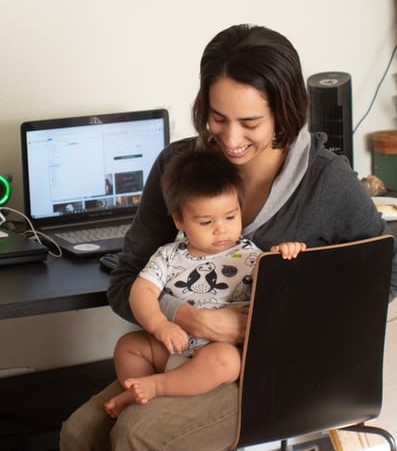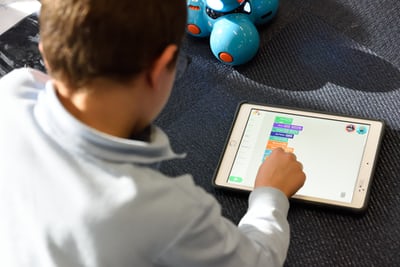The trend of remote working is on the rise, due to the prevalent COVID 19 pandemic and the safety concerns of people around the world. Working from home is the new norm and everyone in the workforce needs to be comfortable with it.
For some people, such as working parents, working from home can be harder than it sounds. Globally, parents are finding it difficult to work from home, with children around them. They complain of distractions & continuous interruptions, lowering their focus levels and jeopardizing productivity.
Working parents not only need to complete work tasks within deadlines, but also need to manage house chores and look after other family members. They need to ensure their kids are busy in productive activities, while they focus on important work tasks.

Hence, we surveyed hundreds of parents regarding their work from home experience with children in the house. Parents of children belonging to a varied range of age groups were researched upon. Parents of a mixed group of new-borns, toddlers, pre-schoolers & teenagers were asked to share their tricks and hacks.
The parental mix chosen for the research belonged to a wide range of occupations, job functions and designations. We also incorporated suggestions from experts such as parental consultants, psychologists, teachers & psychiatrists.
The tips mentioned in this article are tried & tested by parents around the world and we hope they prove beneficial to all working parents this message reaches across to.
Dedicate a workspace

Working in different areas around the house and changing workstations frequently may get confusing for children. In order for children to understand when parents are working and when they are not, it is advised to set a dedicated work station.
This area will be dedicated for work-related tasks and children will need to be explained to remain quiet and keep volumes low when around this corner. For clarity, parents should constrain themselves in their workspace while doing important office-related tasks. When children see a pattern that parents are always busy while at their work table, they are less likely to interrupt in that space.
Parents can sit with their children and design signs that are fun and easy to understand, while communicating clear messages. Marty Basher, organization specialist and a newly working from home dad suggests the use of thumbs up, thumbs down or other easy to understand signs, that can be hung on doors or workstations to communicate with children.
Jason Davis, CEO at Inspire360 suggests handmade signs can also include colors such as Red, Yellow & Green for extra visual cues. Slogans on the signboards, such as “mommy at work”, “daddy’s in a meeting”, “do not disturb Mum” & “play time after 6 pm” may also serve helpful. This way, children will develop an understanding that they need to wait till parents finish their work tasks and step out of their remote workspace.
Decide on feasible working hours & stick to them

Working parents need to determine pre-set working hours. Saurabh Jindal, owner at Talk Travel highlights the importance of discipline and creating work schedules. Parents working from home need to decide what time will they start working and what time will they need to wind up office tasks by.
Jennifer, a mompreneur & CEO at Wonder Woman Writer suggests parents should use a visual timer with light and sound cues. The timer will help everyone understand, when it’s time to work, when to start wrapping work up & when to stop working.
If children are given enough time and attention each day, they are more likely to let parents work during office hours. There needs to be a clear division between working hours and family time, with minimal overlaps. Moreover, children can be trained not to disturb in working hours, unless very necessary.
Suzie Zeldin, the Director of Operations at SmartSitting, a childcare network that employs the top 6% of NYC babysitters and nannies, suggested that working parents can split their day. For example, Mum can work in the morning shift and Daddy can work evenings**. Marisa Donnelly**, a writer, editor, coach and tutor also highlights the importance of dividing responsibilities between partners.
Make schedules & manage tasks effectively

Scheduling is vital, either while working in an office environment or while working from home. Mark Aselstine, Founder of Uncorked Ventures and father of a pre-schooler in California, mentioned that making schedules help in building a child’s routine, from a very early age. Children of all ages need to have schedules made and followed. This will inculcate time management and discipline in them.
Chad Hill, CMO at Hill and Ponton Law, suggests a To-Do list can do wonders in keeping track of tasks and staying on top of things. He suggests, tasks should be tagged according to urgency and deadlines.
Schedules of parents should also be in place and communicated to their children. This way, kids will know when parents are fully available to them and when they are busy with office work.
Week Plan is a superb task management software that helps keep track of tasks and build schedules. Planning can be done on a daily, weekly, monthly or quarterly basis, so the roadmap of tasks to be conducted is clear for both parents and children. Week Plan has several useful features, which make it an effective tool for parents working from home, whether they are entrepreneurs or managers.
Enroll children in an online skill-based course

Children can be enrolled in various online courses, according to their interests and age groups. While children are busy with their online classes or coursework, parents can freely work on their own tasks.
Janet, from Ferone Educational Consulting in Massachusetts, highlighted that this will not only allow parents more time to work, but also enhance the child’s skill set. Learning is an ongoing process and all children should be encouraged to learn new things.
Several kinds of skill-based courses are offered and can be opted for, including but not limited to: public speaking, learning a language, vocational training programs, photography, designing, learning coding, drama/ acting and cooking classes etc.
Set up virtual field trips

As traveling physically is not the safest option due to the COVID 19 pandemic spread, lets shift to virtual traveling. Parents can send children on virtual vacations and allow them to explore the world through the internet.
Virtual tours and videos of museums, national parks, beaches, mountain hikes, streets and popular places can be an interesting, high tech way to keep children engaged. This activity will also enhance curiosity, give children a wider global perspective and improve observation skills.
Sitting behind a computer screen, your children can visit the Seven Wonders of the World, while parents enjoy the liberty to freely work on office tasks. You can find some interesting virtual field trips for your children through this link.
E-Learning applications and websites

Even if children are not going to school, their learning process should never come to a halt. Most schools have assigned home based tasks or reading material, that parents should ask their children to complete while they attend meetings or do office work. Children can ask for guidance or help where needed, but refrain from constantly bugging parents.
For additional help in learning concepts, websites such as Khan Academy, Coursera, Udemy, HubSpot Academy and others are widely available. Academic websites can be subscribed to and E-learning applications can be downloaded for children to use, when parents are occupied. This will ensure children grow and learn, while using their time productively. You can also check out this Parents’ Guide to Google Classroom.
Damon Dietz, contributor to parenting & life advice for single dads at www.DamonDietz.com recommends ABCmouse.com. He says it is an excellent resource, contributing to children’s learning and progress. “The website and app offer appropriate learning and educational games for kids. My son feels like he is playing but he is really learning. He can recognize letters and has even started reading sight words” mentioned Damon, a single dad to three amazing kids.
Reduce dependency & allow children to experiment on their own

The right brought up demands giving children optimal amount of liberty, space and authority to be self-sufficient. All parents should allow their children to experiment and grow.
A controlled environment, extra strictness or close monitoring all the time, may lead to the child feeling suffocated or restricted. If children are given the right amount of freedom, they will be less dependent on parents for minor tasks.

Palwasha Hassan, senior designer at Sania Maskatiya, a high-end fashion label and supermom of two says “Let children imagine, play and be as creative as they can”. This will give them room to make mistakes, self-learn and gain lessons out of their varied experiences.
Children should be brought up in a way that they do small chores themselves. They should have a habit of gathering toys after they are done playing with them, putting things back in place, cleaning their play area and other similar tasks. If children are explained that they need to do basic tasks on their own, parents can save up on valuable time and utilize it for productive working.
Bribery is king!

All parents understand the importance of rewards & gifts when trying to ask children to do a task. As Leslie Stroud, a small business owner & globe trotter likes to say “Bribery is king”. Rewards act as motivation and encourage children to do as they are told.
Children are often stubborn and not willing to cooperate, so parents need to get creative. Offering treats if they behave like a good boy or a good girl is sometimes a quick fix. When children know they will be rewarded for good behavior, they are more likely to stay calm and avoid disturbing parents while they are caught up with work tasks.
However, rewards don’t just include candy, ice cream & new toys, but go much beyond that. Appreciation is a major motivation for most kids, providing them an assurance that parents love them & are happy with their behavior.
Parents can promise children a trip to the beach, camping in the garden, their favorite Disney movie night or a play date over the weekend.

Messy activities are usually most children’s favorite, but disliked by parents as they have to clean up afterwards. Such activities can be offered as rewards for good behavior. They can include playing with slime, hand painting, sand art, Papier-mâché, making & bursting a piñata and arranging a scavenger hunt.
An important thing to note, while bribing children is to stick to promises and abide by deadlines provided. It is vital to display honesty and maintain your child’s innocent trust. As a long term tip, making a weekly reward chart and filling it in with good and bad behavior is a good way to train children.
According to psychologists, the incentive theory also known as Operant Conditioning can help parents working from home. This theory suggests linking responses to rewards. Children can be offered positive reinforcement (rewards) for good behavior and negative reinforcement (punishment) for mischievous actions while parents are trying to work.

Through this article, we established that working from home with kids is difficult, but manageable. If we plan properly and utilize time well, we can maintain a great work-life balance.
Juggling between office tasks and family time can get a little crazy, but using task management software such as Week Plan and remaining organized can very well help out. Children can be indulged in interesting activities, helping them do more, learn new skills and be less of a distraction for their parents.
Conclusion
From the many suggestions received by working parents across the globe, we have summarized the most relevant, interesting, and fun ways to keep children occupied. With this compilation of expert parental tips, tricks and hacks, we want to help parents remain sane, productive, and organized.
Share this article to help many other parents working from home & contribute by mentioning your personal experiences & tips in the comments below!

More Posts
Top 10 Reasons for Low Employee Engagement
Employee engagement is key for a business to do well. When employees are engaged and motivated, they work better and help the company make more money. But, many companies struggle with employees who...
11 Time Management Tips for People With OCD
Obsessive-Compulsive Disorder (OCD) makes daily life hard. It brings unwanted thoughts and rituals that take up a lot of time. Many people exploring OCD and time management techniques struggle because obsessive compulsive disorder...
10 Best Project Management Software for Startups
When you're starting up, every move you make matters. You need systems that work seamlessly from budgeting to hiring, marketing to sales. Amid all these concerns, managing projects becomes pivotal. And, if you're...
5 Weekly Goal Planners for Ambitious Individuals in 2024
Boost your goal achievement with top online weekly planners such as the weekly goal planner. Break down ambitious dreams into manageable tasks, track progress, and reach success! Harness the power of planning and...